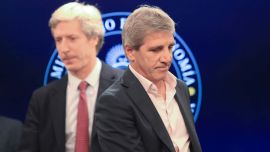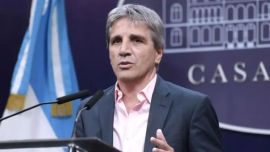In the midst of the financial turmoil facing the government, Argentina’s Economy Minister Sergio Massa is seeking to reassure the markets and anchor soaring parallel exchange rates.
The minister is planning to play two hands in May. On the one hand, he will ask the International Monetary Fund to advance part of the funds the multilateral lender had planned to disburse throughout the rest of the year, around US$10.6 billion in total. Secondly, Massa wants to confirm agreements on prices and wage hikes between employers and union leaders.
Massa’s economic team hopes that a resolution with the International Monetary Fund can be agreed in the next three weeks.
The argument put on the table concerns the impact of the drought not only on the Central Bank's rickety gross reserves, which are about to drop below US$36 billion, but also on tax collection, due to a drop in revenue from duties on agricultural exports and, therefore, its impact on targets in place for Argentina’s fiscal deficit.
However, the IMF will likely ask the government to accelerate the pace of devaluation and improve the exchange rate lag. The expansion of the breach puts a strain on the government's electoral strategy, as this would lead to a depreciation of the peso and, consequently, of its purchasing power.
With three months to go before the PASO primaries and six months before the general election, Massa knows that if he aspires to a presidential candidacy, it would be difficult to stand a chance if the cost of living does not fall. Wages are lagging behind inflation, albeit unevenly, because formal workers overall narrowly beat price rises at the beginning of the year.
That is why Massa will call for a 90-day price and wage agreement, in an attempt to repeat the image of cooperation between the business and trade union sectors seen last November when they helped launch the Precios Justos price control scheme at the CCK.
Last week Massa met with leaders of the Confederación Gremial del Trabajo (CGT) umbrella union group and social movements in a first approach. A sector of the CGT confirmed to this newspaper that they spoke of "looking for a way forward together with businessmen and other organisations.”
"We expressed our support to take decisions in this context and agreed to set up a working table to help social peace and sort out abuses that occurred and speculators," they added.
However, they warned that "the discussion of the paritaria [collective wage-bargaining talks] remains the main tool to help defend the purchasing power of wages.”
Regarding a new meeting that could have employers also seated at the table, there is still no confirmed date. Sources from the industrial sector told Perfil that "the UIA [industry group] will agree to a call from the government, as it has always done, with a predisposition to dialogue and consensus.”
"We have not yet been summoned and we do not know the fine print. It will be a question of listening, seeing what they propose, under what conditions it will be done, but some kind of agreement will be reached," they said.
In the next few days it will be known who from the business sector the government will call to sit down with the unions. At the launch of Precios Justos scheme were, among others, Alfredo Coto (Coto), Francisco de Narváez (Chango Más) and Daniel Funes de Rioja (Copal).
























Comments